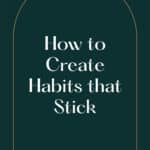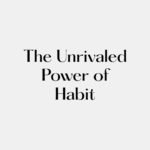Do you ever marvel at the self-discipline of your friend who gets up every morning at 5am to exercise, or the willpower of your coworker who always has a healthy packed lunch? They might not be quite as strong as you think. Willpower is great until it fails, and studies show we are much more susceptible to giving into temptation than we believe… and the people we admire are no different.
What Is Willpower?
Willpower is the ability to control our impulse decisions and delay gratification in lieu of long-term gain. It is fundamental to our success in all areas of life, but it’s not something that runs in the family. Everyone has willpower sometimes, and everyone’s willpower sometimes fails. It’s ok and it’s totally normal, but how do some people seem to have infinite self-discipline? They don’t.

Why It Doesn’t Work
Our brains are programmed to be lazy. They love instant gratification, and in prehistoric times, this would have helped us survive. You take what you can get when you can get it because it might not come again, right?
The thing with willpower is that it ebbs and flows. It uses a lot of our brain power, which is why when we wake up, we may feel excited about going to the gym after work; however, once we reach the afternoon we’re far less likely to muster the strength to actually follow through. Our daily supply is finite, so if you want to achieve a goal, it’s best to first work out what time of day you have the most willpower, and plan your day accordingly. When things need to get done after hours, it’s time to rely on something a little more dependable.
What We Can Use Instead
That’s where habit comes in. Our brains love to run on autopilot. They don’t have to think, they don’t have to will, they just do. If we can associate each of the things we want to achieve to a habit, rather than a decision involving willpower, it’s easier on our brains and therefore, we don’t have to fight to convince ourselves to do it.

What Is Habit
A habit is a settled routine or tendency that can be especially hard to give up. Our brains and bodies get used to a cue that tells us it’s time to perform our ritual, and then for better or worse, we do. Our brain goes into autopilot to complete the practice which usually gives us some kind of reward, be it relaxation, endorphins, or a delicious flavor in our mouths.
Habits can help you start off the day on the right foot, or catch up with your mom every weekend, but they can also be harmful. It’s our duty to our minds and bodies to form helpful habits that allow us to lead healthy lives and reach our full potential. That being said, it can be hard to give up those vices.

How We Can Use Habit in Our Daily Lives
When we want to achieve a challenging goal, we need to rely on more than just willpower. Willpower might get us out of bed a couple of days a week, but we can’t depend on it, and once the chain is broken, it’s very hard to get motivated again.
The trick is to set a system that allows your brain to autopilot. Present no choice, just start the habit and allow your brain to continue through the motions without thinking about it.

Habit Replacement
The hard truth is that habits never really go away. Even if we manage to break them for a couple of days, we will always have to fight the urge, and if we give in just once, we fall right back to where we started. Take a smoker for example. They may be able to quit, but every time their coworkers go out for a smoke, they have to use all their willpower to fight the craving. Every time they pass the cigarettes at the checkout in the grocery store they have to battle the urge to have just one last smoke. This sets us up for failure.
Luckily, there’s a way to hack our mind and use its habit-making to our advantage. What we need to do is to replace the habit.
All habits are made up of 3 parts: The trigger (or cue), the routine, and the reward.
The cue can be sensory, or a time of day, such as lunch time, a certain sound, or getting home from work. The routine is the habit that you carry out, like drinking a coca-cola, turning on the tv, or buying a lottery ticket. And the reward is the feeling you get from completing the habit; de-stressing, a sugar rush, endorphins, etc.
If we want to change the habit, the key is to identify the cue.
What pushes you to carry out the habit? Is it the smell of McDonald’s as you walk past on your way home, or your friend offering you a puff of their cigarette? Once we have identified the trigger, we can work on diffusing it. To do this, we can keep a habit journal and take note of each time we get a craving. Try to write down where you were, who you were with, what time of day, and how you felt to get a clearer picture of what sets you off.
Once you have identified the cue and your routine, identify the reward. Why do you carry out this routine time and time again? What is it about getting home that makes you reach for a beer? Is it the actual taste of the beer? Or is it that you like to take a moment to yourself to destress with a drink after a long day. If the latter, perhaps you could try to sub out the beer for a delicious mocktail.
If we want to successfully change a habit, we need to keep the reward the same but change the routine slightly. This way, our brains still receive the good feeling they are looking for, and we don’t have to consciously think about using our willpower to fight the urge. We just modify how we satisfy them.
Temptation Bundling
If you haven’t yet heard of temptation bundling, you’re going to want to get your notebook out. Katy Milkman came up with the concept, and it basically bundles up activities you’re tempted to do (such as watching your favorite show), with behaviors that are beneficial, but that you often skip (think going to the gym). James Clear, the author of Atomic Habits, recommends an incredible exercise to help you match up things you should do but don’t enjoy, with things you love to help motivate you to make better choices and achieve your goals.
He suggests making a two-column list with the things that bring you pleasure, or that you’re tempted to do on one side, and on the other side, writing a list of the things you should do, but often procrastinate. Then see if you can link up any behaviors to encourage you to get the less appealing work done. Some examples include, only listening to your favorite podcast/music while you clean the house, going to your favorite restaurant to get through the huge backlog of work emails, or meeting up with your friends at the gym and hanging out afterwards.
You can get as creative as you like to encourage yourself to get through the harder tasks and use your time more wisely whilst satisfying your urge to indulge.

Accountability Partners
There’s nothing worse than having told all your friends what you’re going to do, and then fall short. The awkward excuses, the guilt, the sympathetic looks from your friends, it’s enough to motivate anyone to get up off the couch.
Telling your friends can help you visualize your goals, make a plan, and push you to complete it to save face. Who knows, they might even want to join you in your goals and set their own. That way you can work together, it’s a win-win.
Join Our Online Health Coaching
With our personalized health coaching, we teach you how to make baby steps towards building long-lasting habits that serve you and your goals. Each day a new bite-sized lesson becomes available on our platform for you to explore and put into practice.
Whether you want to improve your diet and gut health, your sleep schedule, your stress management, or your movement habits, we can help you make progress towards health and healing.









